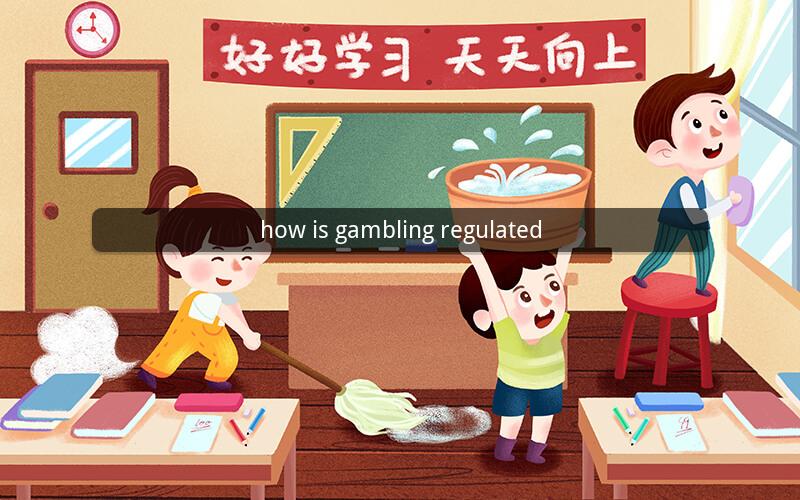
How is Gambling Regulated?
Table of Contents
1. Introduction to Gambling Regulation
2. The Role of Governments in Regulating Gambling
3. Types of Gambling Regulations
4. Legal Framework for Gambling
5. Licensing and Authorization
6. Responsible Gambling Initiatives
7. Age Verification and Protection
8. Online Gambling Regulation
9. Cross-Border Gambling Regulation
10. Conclusion
1. Introduction to Gambling Regulation
Gambling has been a part of human culture for centuries. As the industry has grown, so has the need for regulation to ensure fair play, protect consumers, and prevent criminal activities. This article explores how gambling is regulated across different jurisdictions.
2. The Role of Governments in Regulating Gambling
Governments play a crucial role in regulating the gambling industry. They are responsible for creating and enforcing laws that govern gambling activities, licensing operators, and overseeing compliance with regulations. The primary objectives of gambling regulation are to:
- Prevent fraud and corruption
- Protect vulnerable individuals
- Ensure fair play and transparency
- Generate revenue for government coffers
3. Types of Gambling Regulations
There are various types of regulations that govern the gambling industry, including:
- Prohibition: Banning gambling entirely
- Legalization: Allowing gambling with strict regulations
- Decriminalization: Legalizing gambling without specific regulations
- Regulation: Establishing rules and regulations for gambling operators
4. Legal Framework for Gambling
The legal framework for gambling varies from one jurisdiction to another. Some countries have a comprehensive legal framework that covers all aspects of gambling, while others have a more fragmented approach. Key elements of the legal framework include:
- Licensing requirements
- Taxation
- Age restrictions
- Advertising and marketing regulations
- Prohibition of certain forms of gambling
5. Licensing and Authorization
Licensing and authorization are essential components of gambling regulation. Operators must obtain a license from the relevant regulatory authority before they can offer gambling services. The licensing process typically involves:
- Background checks on the operator
- Financial checks
- Compliance with legal and regulatory requirements
- Payment of a licensing fee
6. Responsible Gambling Initiatives
Responsible gambling initiatives aim to promote safe and responsible gambling practices. These initiatives may include:
- Self-exclusion programs
- Deposit limits
- Time-out buttons
- Education and awareness campaigns
- Support services for problem gamblers
7. Age Verification and Protection
Age verification is crucial to prevent underage gambling. Operators must implement robust age verification systems to ensure that only individuals of legal age can access gambling services. Protection measures include:
- Age verification checks at the point of registration
- Regular age verification checks during gameplay
- Identification checks for high rollers
8. Online Gambling Regulation
Online gambling regulation is a complex issue, as it involves cross-border operations and different regulatory frameworks. Key aspects of online gambling regulation include:
- Licensing and authorization for online operators
- Compliance with data protection and privacy laws
- Prohibition of unlicensed operators
- Age verification and responsible gambling measures
9. Cross-Border Gambling Regulation
Cross-border gambling regulation is challenging due to differences in legal frameworks and enforcement capabilities. Cooperation between jurisdictions is essential to combat illegal gambling activities. Key strategies include:
- Mutual recognition of licenses
- Information sharing
- Joint investigations and enforcement actions
10. Conclusion
Gambling regulation is a vital component of the gambling industry, ensuring fair play, protecting consumers, and preventing criminal activities. Governments play a crucial role in regulating the industry, with various regulations and initiatives in place. As the industry continues to evolve, it is essential for regulators to adapt and respond to emerging challenges.
Questions and Answers
1. What is the primary objective of gambling regulation?
- To prevent fraud and corruption, protect vulnerable individuals, ensure fair play and transparency, and generate revenue for government coffers.
2. What are the types of gambling regulations?
- Prohibition, legalization, decriminalization, and regulation.
3. What is the role of governments in regulating gambling?
- Governments are responsible for creating and enforcing laws, licensing operators, and overseeing compliance with regulations.
4. What are the key elements of the legal framework for gambling?
- Licensing requirements, taxation, age restrictions, advertising and marketing regulations, and prohibition of certain forms of gambling.
5. What is the purpose of licensing and authorization?
- To ensure that operators meet legal and regulatory requirements and protect consumers.
6. What are responsible gambling initiatives?
- Self-exclusion programs, deposit limits, time-out buttons, education and awareness campaigns, and support services for problem gamblers.
7. Why is age verification important in gambling?
- To prevent underage gambling and protect vulnerable individuals.
8. What are the challenges of online gambling regulation?
- Cross-border operations, different regulatory frameworks, and the need for cooperation between jurisdictions.
9. How can cross-border gambling regulation be improved?
- Through mutual recognition of licenses, information sharing, and joint investigations and enforcement actions.
10. What is the future of gambling regulation?
- It is likely to continue evolving to address emerging challenges and adapt to changing industry dynamics.